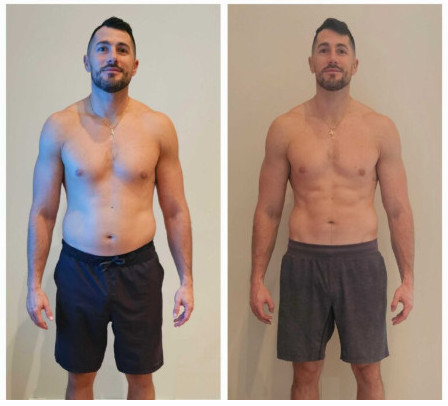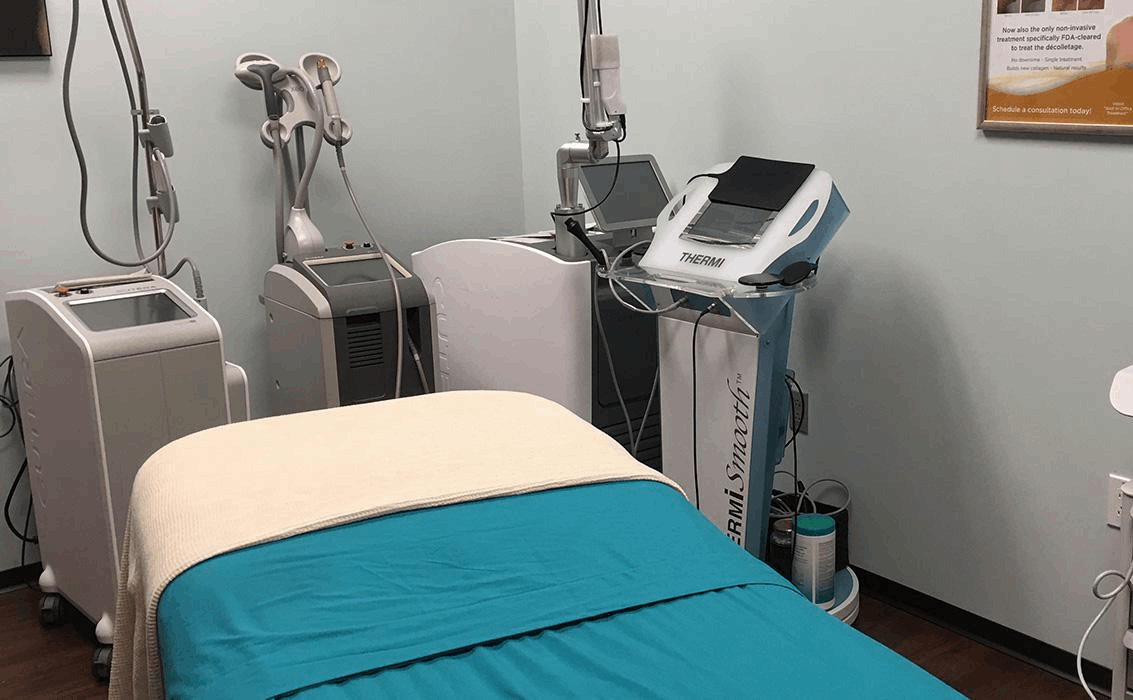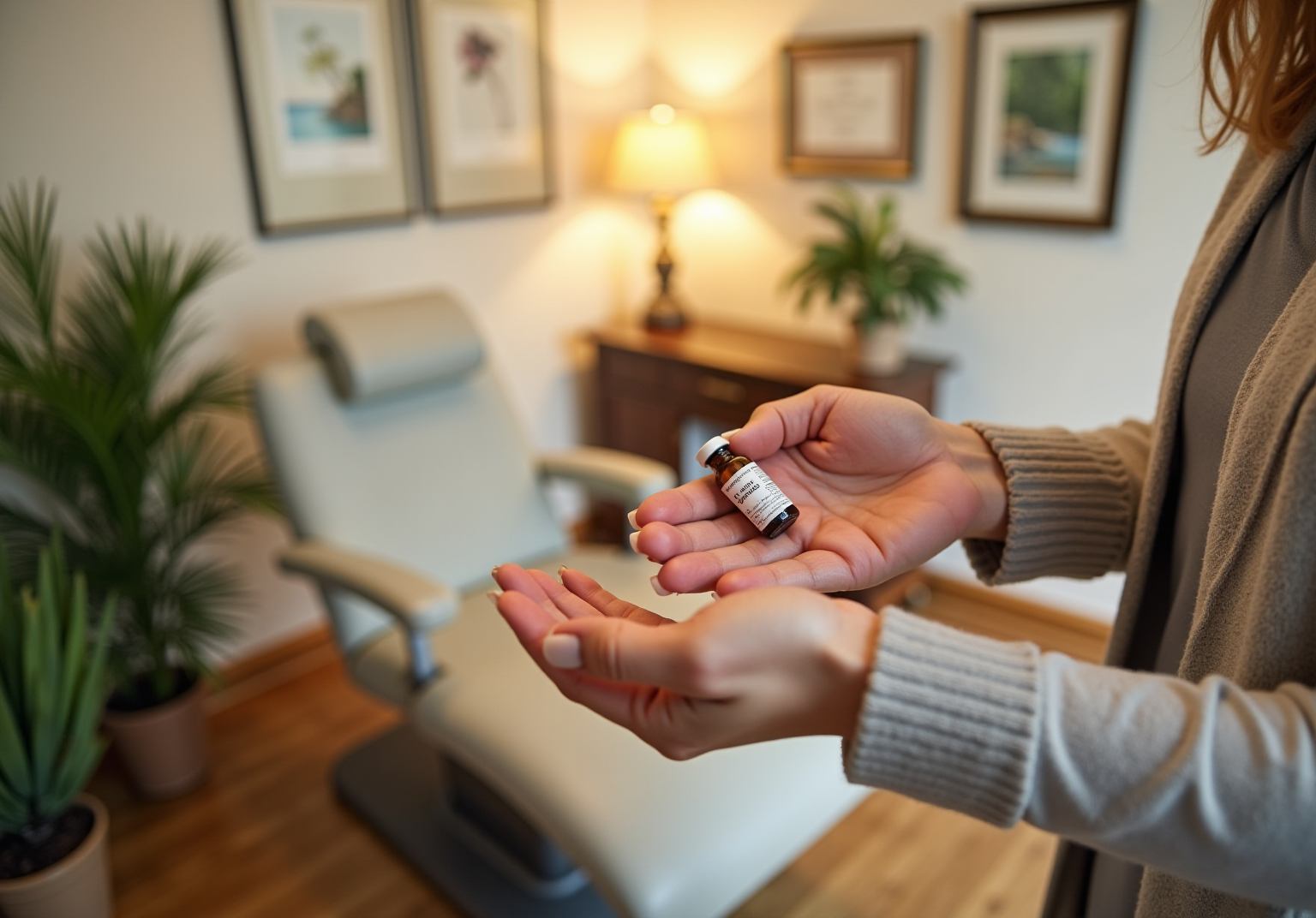Introduction
Many women grappling with arthritis often find themselves searching for effective relief methods. Testosterone replacement therapy (TRT) emerges as a promising option that deserves attention. This article explores the multifaceted benefits of TRT specifically for women, highlighting how it can alleviate joint pain, enhance mobility, and improve overall quality of life.
Yet, amidst the optimism, questions linger: Is TRT truly a game-changer for arthritis, or merely a complementary strategy? We understand that navigating these options can be overwhelming. Exploring the nuances of this therapy can illuminate its potential role in managing arthritis symptoms. Together, we can empower women to make informed health decisions that support their wellness journey.
Woodlands Wellness & Cosmetic Center: Personalized TRT for Arthritis Relief
At Woodlands Wellness & Cosmetic Center, we understand the challenges women face when dealing with joint pain. That’s why we offer customized testosterone replacement therapy (TRT) specifically tailored for women, who often ask, does TRT help with arthritis symptoms? Our approach involves thorough assessments and personalized treatment plans, ensuring that each patient receives the optimal care they deserve. By prioritizing hormonal balance, we aim to reduce joint pain and enhance the overall quality of life for our clients.
Research shows that women who undergo hormone replacement therapy (HRT) for a year or more experience a 30% reduction in knee and hip osteoarthritis rates compared to those who do not. This statistic highlights the potential of TRT and raises the question of whether does TRT help with arthritis in effectively managing joint inflammation. Furthermore, our successful TRT programs have led to significant improvements in patients’ symptoms, with many reporting enhanced mobility and reduced discomfort.
The benefits of personalized TRT extend beyond just pain relief; they also include improved energy levels and overall well-being. As illustrated in case studies, women like Marcella Hill have transformed their lives through tailored testosterone therapies, sparking important conversations about women’s health. At Woodlands Wellness & Cosmetic Center, we remain dedicated to providing comprehensive hormone health solutions while exploring whether does TRT help with arthritis treatment.
If you’re interested in exploring TRT for joint pain relief, we encourage you to consult with our healthcare providers. Together, we can discuss your options and consider lifestyle changes that can support your health journey.
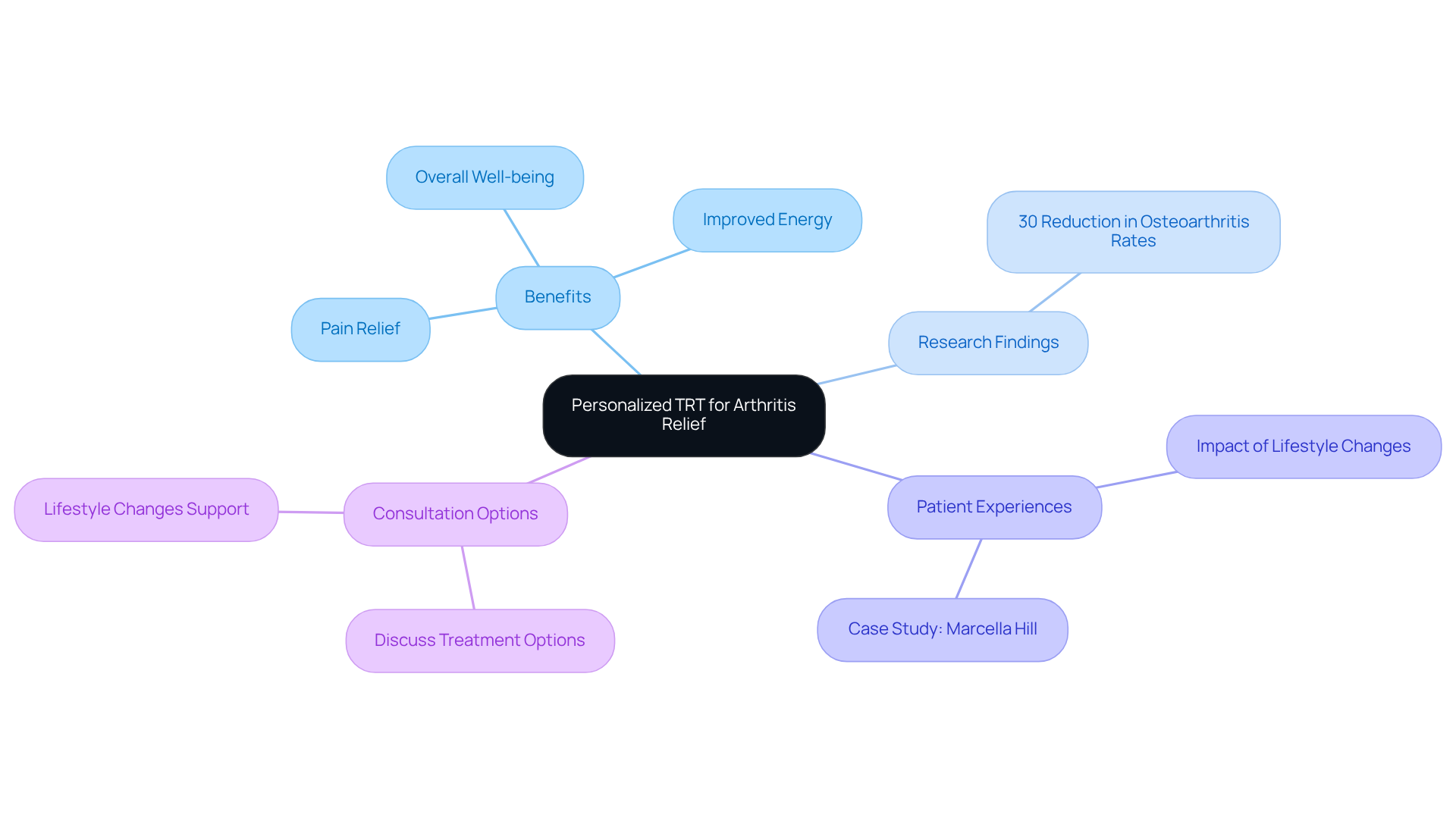
Reduce Joint Pain and Stiffness with Testosterone Replacement Therapy
A common question is whether testosterone replacement therapy (TRT) does help with arthritis in women, especially in alleviating pain and stiffness in the affected areas. We understand how challenging it can be to cope with discomfort, and research suggests that optimizing testosterone levels can lead to significant decreases in inflammation, a major contributor to joint pain. In clinical studies, 64% of women undergoing TRT reported an improvement in discomfort at three months, raising the question of whether TRT helps with arthritis, alongside a notable reduction in arthralgias. This improvement can enhance mobility and overall quality of life, raising the question of whether TRT does help with arthritis as an effective intervention for joint inflammation symptoms.
Furthermore, expert opinions support these findings, suggesting that TRT not only addresses hormonal imbalances but also plays a crucial role in modulating inflammatory responses in the body. This dual action can be especially beneficial for women, who often face increased discomfort and stiffness during menopause due to declining estrogen and testosterone levels. By replenishing these hormones, TRT may help reduce the inflammatory processes that exacerbate musculoskeletal conditions, which raises the question: does TRT help with arthritis, leading to improved health and function?
In addition, recent studies have underscored that TRT helps with arthritis by effectively reducing inflammation linked to joint disease. For instance, one study found that women undergoing testosterone treatment noted significant enhancements in pain ratings and stiffness in their limbs compared to those on placebo. The therapy was well-tolerated, with minimal side effects reported, making it a viable option for many women seeking relief from arthritis-related discomfort. Overall, many wonder does TRT help with arthritis, as it represents a valuable strategy for enhancing joint function and reducing inflammation, offering hope for women facing joint disorders. Together, we can explore this option for a better quality of life.

Understanding the Limitations of TRT: Not a Cure for Arthritis
Many wonder if testosterone replacement therapy (TRT) does help with arthritis, as it can be a beacon of hope for those struggling with joint pain. However, it’s essential to remember that TRT isn’t a one-size-fits-all solution. Instead, think of it as a vital piece of a larger puzzle that includes lifestyle changes, physical therapy, and other medical interventions.
Research shows that individuals with the highest levels of testosterone have a 51% lower risk of developing joint inflammation compared to those with the lowest levels. This statistic highlights just how important it is to keep an eye on male hormone levels as part of managing joint health. Furthermore, studies suggest that lower testosterone levels are linked to a greater risk of joint inflammation, leading to the inquiry of whether does TRT help with arthritis in this context.
For those seeking relief, it’s crucial to work closely with healthcare providers to develop a personalized plan that addresses the unique aspects of their condition. This comprehensive approach not only tackles the symptoms but also considers the underlying factors contributing to joint pain, paving the way for a more effective and sustainable path to relief.
As Pooja Toshniwal Paharia points out, hormonal factors like testosterone are connected to the development of knee osteoarthritis. This connection further supports the idea of integrating TRT into a broader treatment strategy, particularly in addressing the question of does TRT help with arthritis. However, it’s important to approach this information with caution, as studies have limitations, including the challenge of establishing direct causal relationships. Keeping this in mind can help you evaluate whether does TRT help with arthritis more thoughtfully.

Enhance Joint and Bone Health Through Testosterone Therapy
Are you struggling with joint pain? You’re not alone. Many people face this challenge, and it can be incredibly frustrating. Fortunately, many people wonder if testosterone therapy does TRT help with arthritis by playing a vital role in alleviating joint pain and enhancing your joint and bone health. Research shows that maintaining sufficient hormone levels is linked to improved bone density and strength, which are essential for preventing osteoporosis and fractures.
For instance, studies indicate that women, particularly those over 65, experience a higher risk of osteoporosis when hormone levels drop. This is a concern we understand deeply. But there’s hope! Combined therapy with estradiol has proven to be more effective in boosting bone mineral density than estradiol alone. By sustaining healthy hormone levels, women can strengthen their musculoskeletal system, reducing the risk of joint decline and enhancing overall physical resilience as they age.
Together, we can take steps toward better health. Consider discussing testosterone therapy with your healthcare provider to explore whether does TRT help with arthritis for you. Your journey to improved well-being starts with understanding your options.

Explore Other Strategies for Supporting Joint Health
When it comes to improving the health of your connective tissues, exploring whether TRT helps with arthritis, along with various strategies, can make a significant difference. We understand that a balanced diet rich in anti-inflammatory foods is crucial. By incorporating omega-3 fatty acids from sources like fatty fish, flaxseeds, and walnuts, you can help manage arthritis symptoms and reduce inflammation. As Marie-Luise Huber wisely notes, “Omega-3 fatty acids function as natural anti-inflammatories, rendering them advantageous for musculoskeletal health.” Research supports this, showing that omega-3s can relieve discomfort and enhance function.
Engaging in consistent low-impact activities – like swimming, walking, or cycling – can also enhance your mobility and alleviate discomfort. These gentle exercises help lubricate your joints and maintain mobility without putting excessive strain on them. Many individuals who adopt regular low-impact routines report significant improvements in their mobility and overall well-being.
Additionally, consider supplements such as glucosamine, which may support cartilage health and joint function. Physical therapy can also be a valuable resource, offering tailored exercises and techniques to enhance mobility and reduce discomfort. Lifestyle changes, such as maintaining a healthy weight and managing stress, are essential for keeping your connections healthy. Prioritizing sleep is equally important, as it aids in the repair of cartilage and connective tissue. If you’re experiencing persistent pain, seeking professional treatment can help address your concerns effectively.
To start making positive changes, why not incorporate one new anti-inflammatory food into your diet each week? This small step can contribute to better joint health and overall wellness. Together, we can work towards a healthier, more comfortable life.
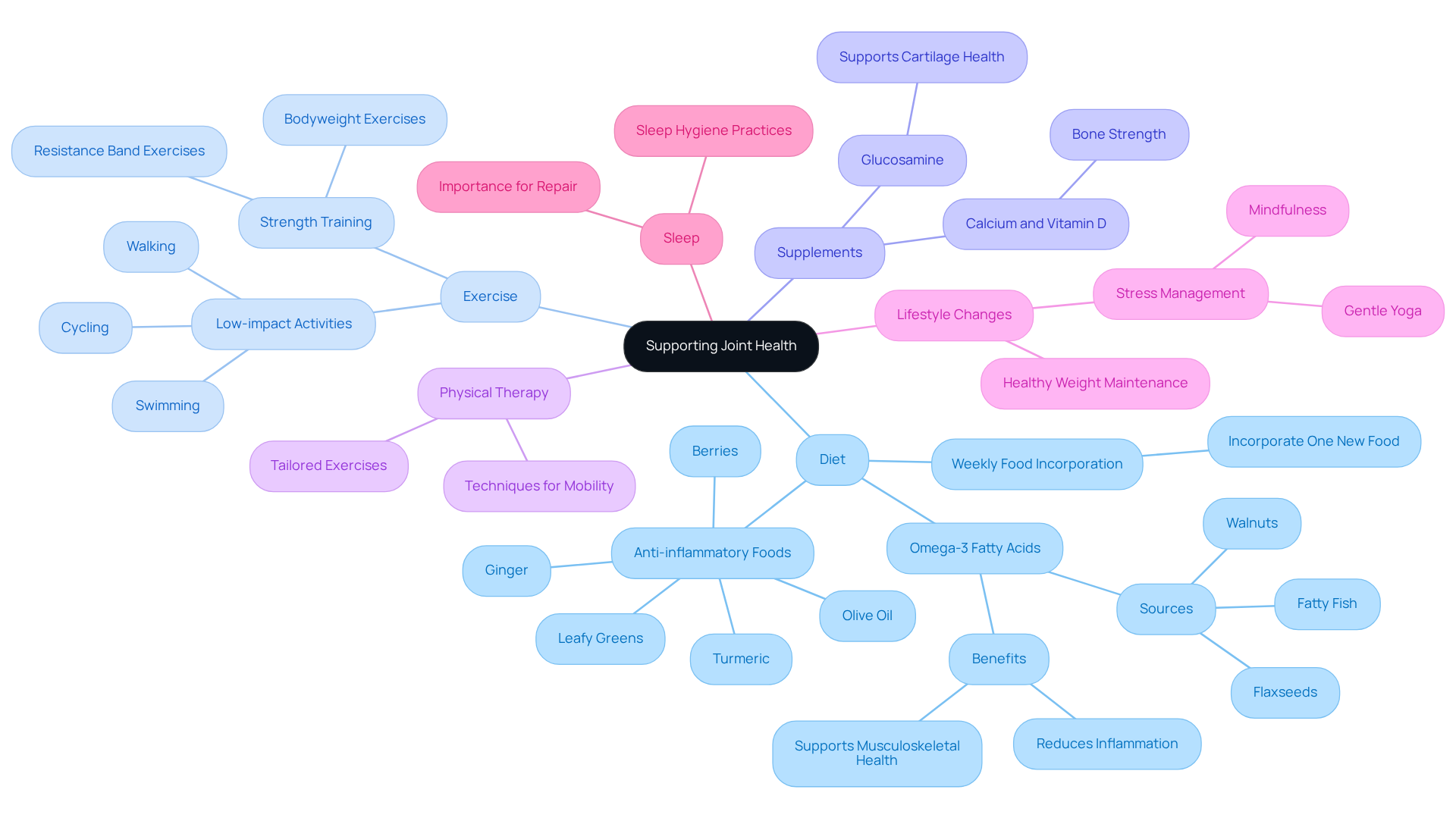
Empower Yourself: The Role of Education in Arthritis Management
Empowering yourself through education is essential for effectively managing joint pain. We understand that navigating this condition can be challenging, but a comprehensive understanding of your situation, available treatment options, and the influence of hormones can profoundly affect your health outcomes.
At Woodlands Wellness & Cosmetic Center, we emphasize the importance of patient education. We offer a wealth of resources and support to guide you through your treatment journey. Studies show that knowledgeable patients are more inclined to follow treatment regimens, resulting in better control of joint discomfort. In fact, approximately 58.5 million Americans are affected by joint pain, highlighting the significance of understanding this condition.
By equipping yourself with knowledge, you can make informed decisions that enhance your well-being and quality of life. As Felicia Johnson, RN, MSN, AMB-BC, states, “It helps them with medication adherence when they can understand the disease, treatments, and symptoms that they have.” Our commitment to patient empowerment ensures that you have the tools necessary to navigate your health challenges confidently.
Furthermore, utilizing methods like the teach-back approach can further improve your understanding and adherence to treatment. Education is a vital component of effective arthritis management, especially in understanding how does TRT help with arthritis as we work towards a healthier future.

What to Expect from Testosterone Replacement Therapy
Starting hormone replacement therapy can be a significant step in your wellness journey, and it’s completely normal to have questions and concerns. As you begin this process, you can look forward to a gradual improvement in your symptoms. Many patients wonder if TRT helps with arthritis, as they notice an increase in energy levels, a boost in mood, and a reduction in joint pain.
However, it’s important to remember that optimal results may take several weeks to months to fully manifest. This journey is unique for everyone, and patience is key. Regular follow-up appointments will be essential to monitor your hormone levels and adjust your treatment as needed, ensuring that you receive the best care possible.
We understand that navigating this process can feel overwhelming at times, but you’re not alone. Together, we can work towards achieving your health goals. If you have any questions or need support, don’t hesitate to reach out. Your well-being is our priority.
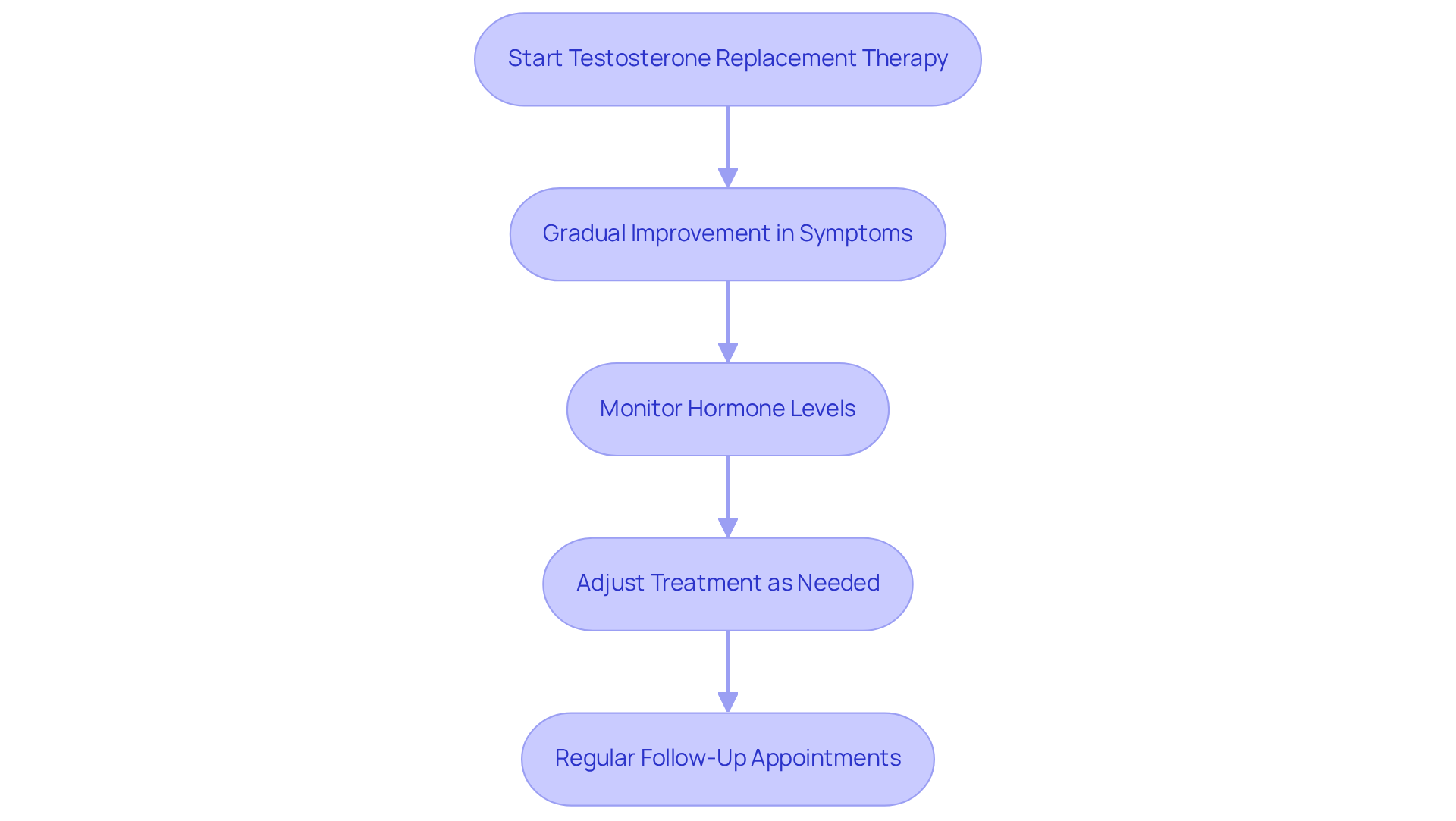
How Woodlands Wellness & Cosmetic Center Supports Your TRT Journey
At Woodlands Wellness & Cosmetic Center, we understand that your journey through hormone replacement therapy (TRT) is deeply personal. That’s why we prioritize personalized care and comprehensive support tailored just for you. Each patient’s needs are unique, and our experienced team is dedicated to crafting TRT programs that align with your individual health profile and goals.
Regular monitoring of hormone levels is essential. It not only helps us adjust dosages for optimal results but also allows us to identify any potential complications early on. We believe that knowledge is power, which is why we provide ongoing education to empower you. Understanding the importance of hormone balance and exploring whether TRT helps with arthritis and inflammation management is key to your wellness journey.
Our dedicated staff is always here for you, ready to answer your questions and address any concerns. We foster a supportive environment where you can feel confident in your treatment plan. Furthermore, our recent updates in patient care protocols emphasize the significance of consistent monitoring, which has been shown to significantly enhance treatment outcomes.
By utilizing advanced tracking systems, we ensure that you receive timely follow-ups and necessary adjustments to your therapy. This proactive approach not only improves the effectiveness of TRT but also enhances your overall satisfaction with the process.
At Woodlands Wellness & Cosmetic Center, we’re here to guide you every step of the way. Together, we can make your TRT journey as smooth and beneficial as possible.
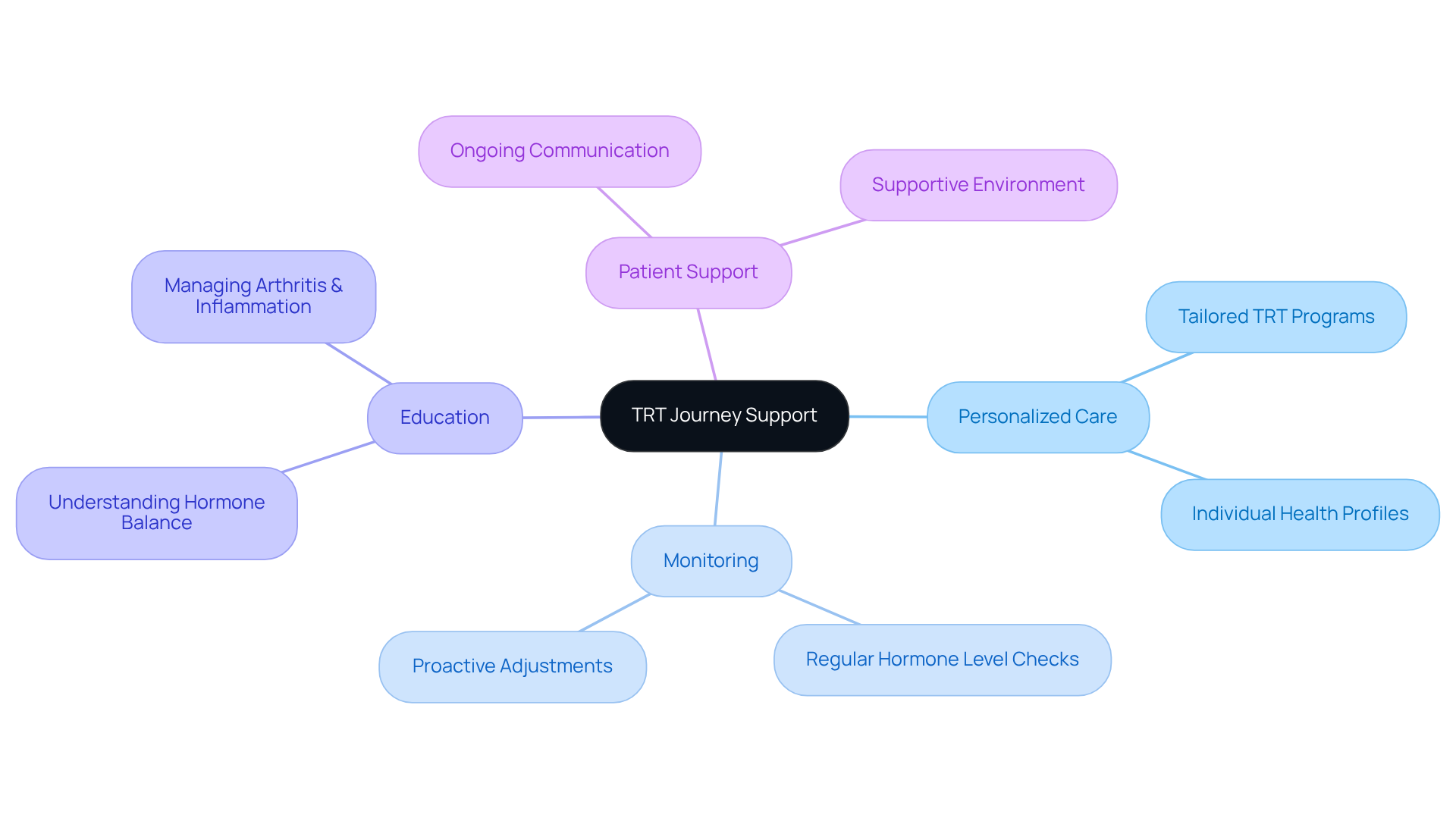
FAQs: Common Questions About TRT and Arthritis
-
Is TRT safe for women? Yes, hormone replacement therapy (TRT) can be a safe and effective option for women when it’s administered under medical supervision. We understand that navigating hormone therapy can be daunting, but recent studies show that testosterone therapy can enhance sexual function and overall well-being. However, it’s crucial to monitor for potential side effects, especially with oral administration, which may lead to increased LDL cholesterol levels.
-
How long does it take to see results? Many patients begin to notice improvements within just a few weeks of starting TRT. It’s important to remember that optimal results may take several months. Research indicates that significant enhancements in sexual desire, arousal, and satisfaction can occur, with some women experiencing an increase in satisfactory sexual events within four weeks. This journey is unique for everyone, and we’re here to support you through it.
-
Are there side effects? Like any medical treatment, TRT may come with side effects. Commonly reported issues include weight gain, acne, and increased body hair. We encourage you to maintain open communication with your healthcare provider to manage these effects effectively. Studies have shown that non-oral administration methods tend to have a more favorable side effect profile, which is something to consider when discussing options with your doctor.
-
Can TRT remedy joint inflammation? No, TRT is not a remedy for joint inflammation; however, it can assist in managing symptoms and enhancing your quality of life. Research shows a negative correlation between low serum testosterone levels and the likelihood of developing this condition. This implies that the question of whether TRT does help with arthritis is relevant, as it may contribute to symptom relief and overall musculoskeletal health. Together, we can explore the best options for your wellness journey.
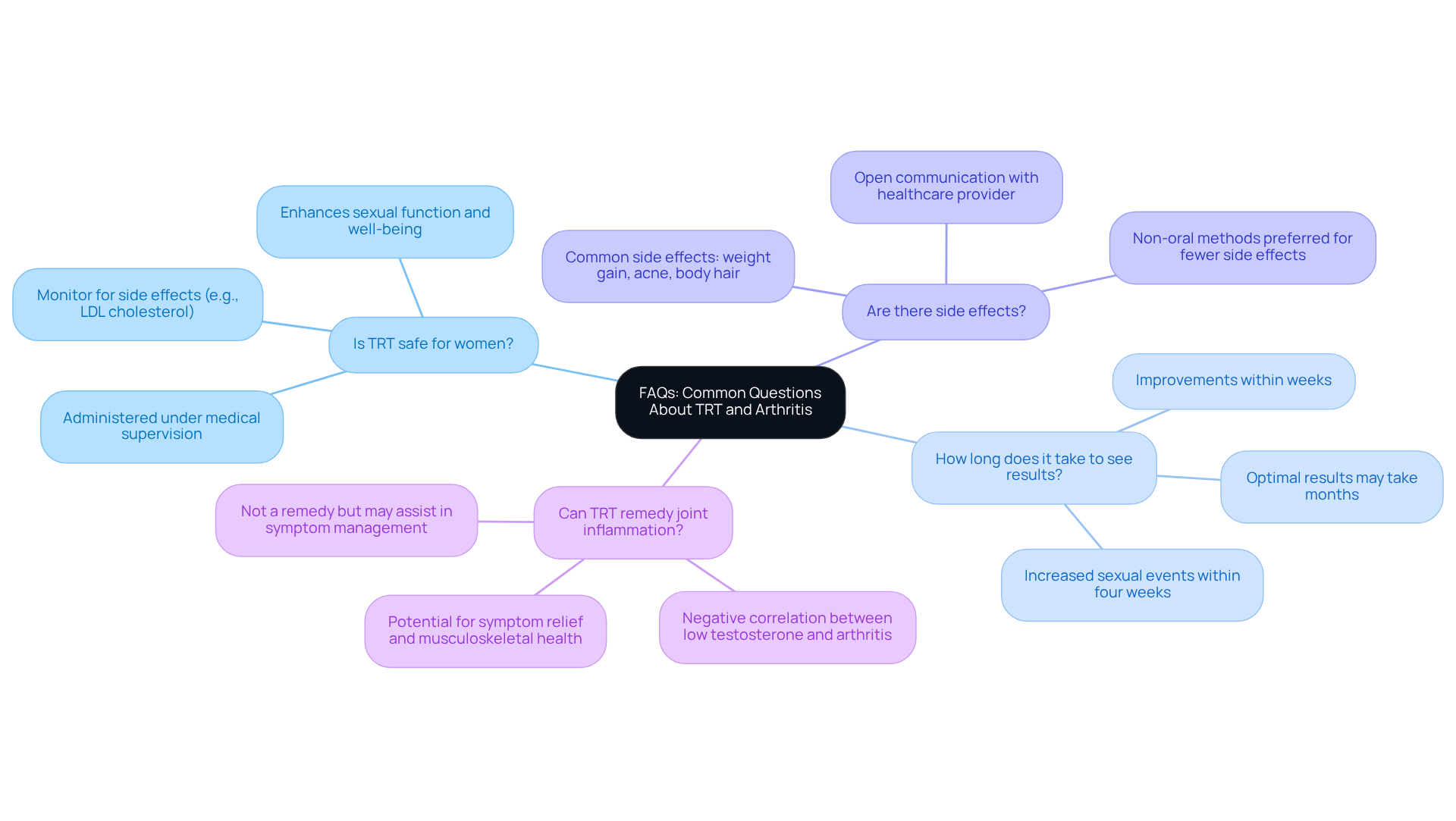
Final Thoughts on TRT and Its Impact on Arthritis
Many wonder if testosterone replacement therapy (TRT) does help with arthritis, as it can be a vital support for women facing joint pain. We understand how debilitating this can be, and TRT offers a holistic approach by relieving pain, promoting flexibility, and enhancing overall well-being. Studies indicate that maintaining ideal hormone levels is crucial for skeletal health; reduced levels are linked to a higher risk of joint disorders, leading to the inquiry of whether TRT helps with arthritis, with an odds ratio of 1.22 for low hormone levels and osteoarthritis.
At Woodlands Wellness & Cosmetic Center, we prioritize personalized care. Our goal is to empower you to reclaim your health and improve your quality of life. Many women have shared their success stories, reporting significant improvements in their daily activities and overall vitality after starting TRT. For example, one patient expressed how her pain levels dropped dramatically, allowing her to return to the activities she cherished.
This comprehensive strategy not only addresses the physical aspects of arthritis but also explores how TRT helps with arthritis in nurturing emotional and psychological resilience. We want you to feel supported throughout your wellness journey. As expert Evan Lederman notes, ‘Emerging evidence suggests that testosterone may also play a protective role in joint health, leading to the question of whether TRT helps with arthritis.’ Together, we can explore how TRT might be the right choice for you.
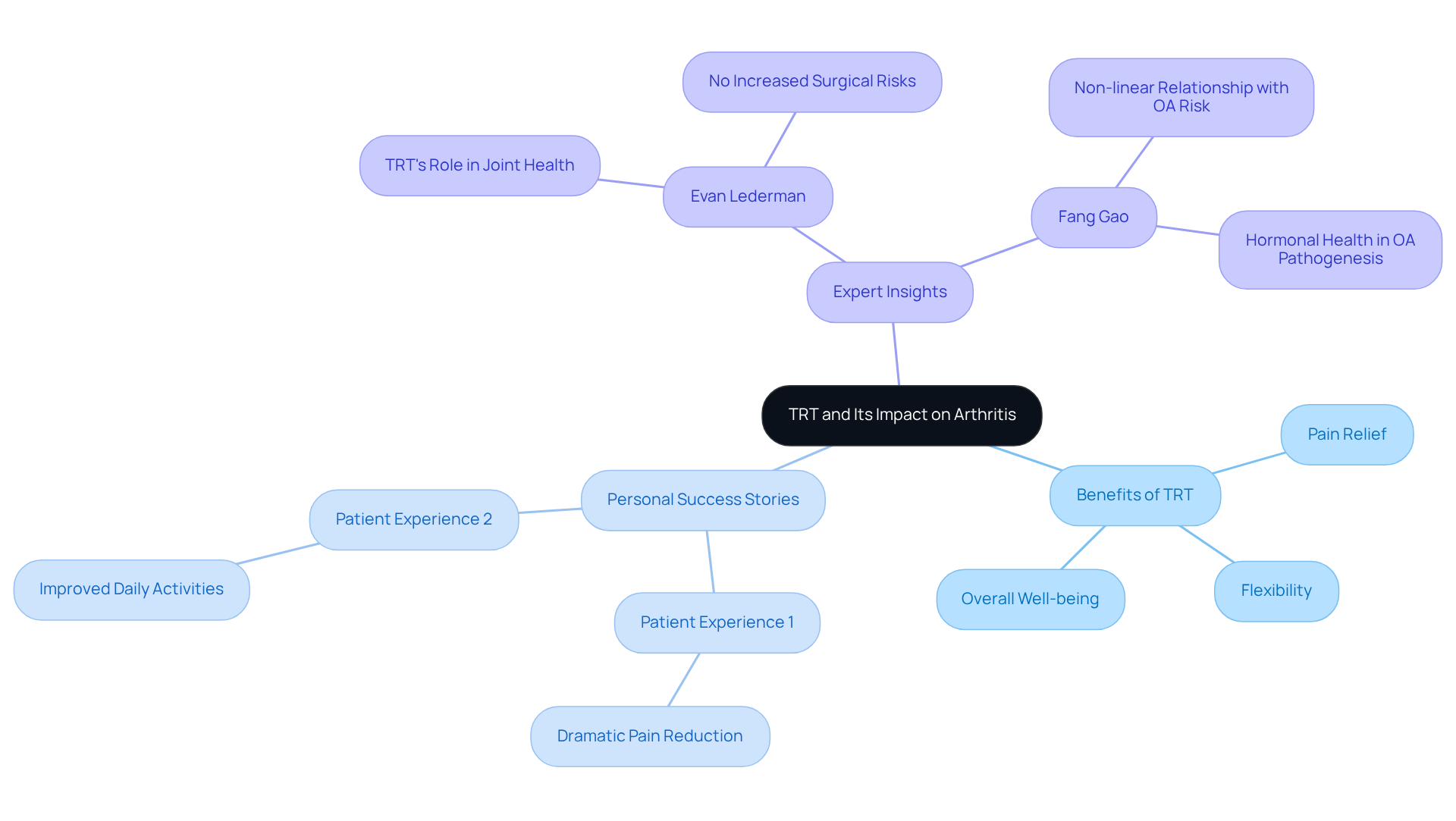
Conclusion
For many women grappling with arthritis symptoms, testosterone replacement therapy (TRT) offers a glimmer of hope. This therapy not only addresses hormonal imbalances but also plays a crucial role in reducing inflammation and improving joint function. At Woodlands Wellness & Cosmetic Center, we take a personalized approach, ensuring that each woman’s unique health needs are met. This nurturing environment fosters healing and enhances quality of life.
Throughout our exploration, we’ve shared various insights and research findings that underscore the effectiveness of TRT in alleviating joint pain and stiffness. Studies show that women undergoing TRT often experience significant improvements, such as reduced discomfort and increased mobility. Furthermore, integrating lifestyle changes, nutritional support, and education about arthritis management empowers women to take charge of their health and well-being.
Ultimately, considering TRT for arthritis relief is a vital step toward reclaiming a more active and fulfilling life. By understanding the potential benefits and limitations of this therapy, women can make informed decisions about their treatment options. As you embark on this journey toward better joint health, remember that embracing a holistic approach-one that includes education, lifestyle modifications, and professional support-can lead to lasting improvements in overall wellness. Together, we can navigate this path to a healthier, more vibrant life.
Frequently Asked Questions
What is testosterone replacement therapy (TRT)?
Testosterone replacement therapy (TRT) is a medical treatment designed to restore testosterone levels in the body, which can help alleviate various symptoms, including joint pain and stiffness, particularly in women.
How does TRT help with arthritis symptoms?
TRT can help reduce joint pain and inflammation associated with arthritis by optimizing testosterone levels, which has been shown to decrease inflammatory responses in the body.
What evidence supports the effectiveness of TRT for arthritis relief?
Research indicates that women undergoing hormone replacement therapy experience a 30% reduction in knee and hip osteoarthritis rates. Additionally, 64% of women in clinical studies reported improvement in discomfort after three months of TRT.
Are there any additional benefits of personalized TRT beyond pain relief?
Yes, personalized TRT can also lead to improved energy levels and overall well-being, enhancing the quality of life for women undergoing treatment.
Is TRT a cure for arthritis?
No, TRT is not a cure for arthritis. It should be considered part of a comprehensive treatment plan that includes lifestyle changes and other medical interventions.
What is the importance of testosterone levels in relation to joint health?
Higher testosterone levels are associated with a 51% lower risk of developing joint inflammation. Low testosterone levels can increase the risk of joint pain and inflammation.
How should individuals approach TRT for arthritis?
It is essential for individuals to work closely with healthcare providers to develop a personalized plan that addresses their unique condition and incorporates various treatment options.
What should be considered when evaluating the effectiveness of TRT for arthritis?
While TRT shows promise in managing arthritis symptoms, it is important to recognize the limitations of studies and the need for a comprehensive approach to treatment.



